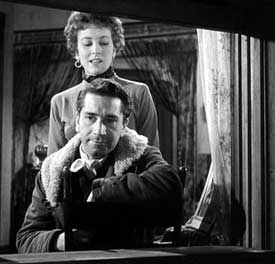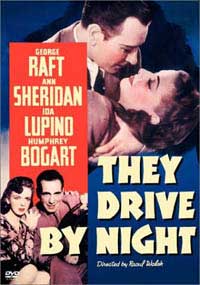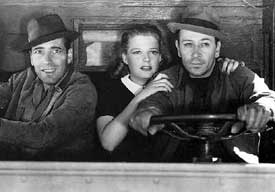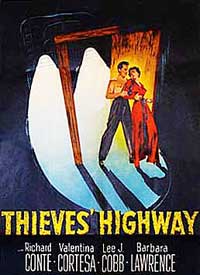From a novel by Albert Isaac Bezzerides (Thieves' Market, 1949), & adapted to the screen by the novelist himself, the unusual film noir Thieves' Highway (1949) follows fruit truckers from rural orchards to San Francisco marketplace, a tough route for tough working class men.
Nick Garcos (Richard Conte), just back from the War, invests his only dime in a run-down truck, & races other truckers to get the earliest hence most profitable apples to market.
 Nick will be dealing with racketeering wholesaler Mike Figlia (Lee J. Cobb) who he has every reason to believe grievously wronged his father (Morris Carnovsky), causing him to become crippled. When the vile deed is proven to his satisfaction, further satisfaction will be required. Nick will be dealing with racketeering wholesaler Mike Figlia (Lee J. Cobb) who he has every reason to believe grievously wronged his father (Morris Carnovsky), causing him to become crippled. When the vile deed is proven to his satisfaction, further satisfaction will be required.
As things go from bad to worse, Nick is betrayed but finally assisted by a harlot with a heart of gold (Valentina Cortese), as compared to his fiancee (Barbara Lawrence) who has a viciously selfish heart.
The romance between the trucker & the harlot is unusual for Hollywood which would ordinarily want such a character to be a femme fatale punished by the end. Only Dassin, shortly to be blacklisted, would've attempted to slip this through.
The timely wickedness of Nick's fiancee was a "script revision" imposed by the producer who thought the audience wouldn't otherwise go for the idea of a harlot as serious love interest, & required the usual "good" girl of the story to come off so heartless that even a harlot would be a better choice to love. But that little imposition of having the fiancee show up momentarily in San Francisco to prove herself a bitch was better than not being permitted to let Valentina Cortese create her extraordinary & nuanced "bad girl gone good" character.
Shortly after wrap, Dassin was off to England then Europe, & would not be permitted to work in the US again thanks to McCarthyism. As he was not around to even try to stop interference with the final cut of Thieves' Highway, the original film noir cynicism of the climax was discarded & replaced with a "happy" ending he did not direct, which amounts to a fist-fight & a happy-ever-after.
Despite the Hollywood ending, this is a fine film, one that Dassin was rightly proud to have directed.
 George Raft, although often typecast as a tough-guy gangster, is in They Drive by Night (1940) the good-guy, a working class fellow with dreams of establishing his own trucking company. His leading lady is Ann Sheridan as Cassie Hartley, the first gal Joe has ever completely loved. George Raft, although often typecast as a tough-guy gangster, is in They Drive by Night (1940) the good-guy, a working class fellow with dreams of establishing his own trucking company. His leading lady is Ann Sheridan as Cassie Hartley, the first gal Joe has ever completely loved.
Though Raft & Sheridan had first & second billing & the film is constructed around their characters, in retrospect They Drive by Night is usually pitched or packaged as a Humphrey Bogart & Ida Lupino film. Bogart had fourth billing originally, & Lupino third, but even when the film was a new release, Lupino completely stole the movie as her own.
Bogart, like Raft, had before this been cast predominantly as a heavy. This time he's Paul, Joe's brother. Paul & his wife Pearl (Gale Page) are agreed it'd be better if Paul could settle down in a regular trucking job with more regular hours so he could have a home life & finances would be stable enough for them to have a baby. But he doesn't want to let Joe down, so struggles alongside his brother as independent truckers who can't quite get ahead even if they stay on the road for weeks on end.
Constantly in debt & with fretfully hurried scheduled & on the verge of having their truck reposessed, it's a dangerous job at best, & independent wildcat truckers always get the short end. Yet the day comes when they are shocked to be able to pay off the truck & own it outright. Alas, that turns out to be the same day they have a ferocious accident, with Paul badly enough injured that he'll have to retire from trucking altogether, & Joe having to go to work for an old friend who owns a big trucking company.
For that long portion of the film when Joe & Paul are independent truckers, it's very much a proletarian tale of honest guys pitted against gangsterish businessmen in San Francisco & L.A.. It's action-packed with fisticuffs & dangerous driving. The portraits of truckers' lives is throughout convincing, having taken its important cues from A. I. Bezzerides The Long Haul (1938), a novel similar to the one that inspired Jules Dassens' Thieve's Highway.
 The second half of the film, with Joe now managing his friend's trucking firm, becomes a tale of murder with one of the grimmest femme fatales ever seen. Ida Lupino as Lana Carlson is married to the big boss, but has an obsessive eye for Joe. Joe is beholden to his boss & not interested in married women, but Lana is relentless. When Joe absolutely refuses to betray Ed (Alan Hale), Lana becomes increasingly resentful of her marriage. The second half of the film, with Joe now managing his friend's trucking firm, becomes a tale of murder with one of the grimmest femme fatales ever seen. Ida Lupino as Lana Carlson is married to the big boss, but has an obsessive eye for Joe. Joe is beholden to his boss & not interested in married women, but Lana is relentless. When Joe absolutely refuses to betray Ed (Alan Hale), Lana becomes increasingly resentful of her marriage.
Most films of this type would be expected to focus mainly on the adventures of the men, with their love interests taking up a small amount of space; indeed, there'd be no women at all in a tale of truckers, except that the whole macho syndrome requires that ladies fall for a hero in as short an amount of time as possible to get her over with.
But in They Ride by Night the women who love truckers, Pearl & especially Cassie, also get fairly complete character roles. And the character of Lana, a pure film noir figure of abject villainy, overwhelms everything else about the film. Her character was borrowed less from Bezzerides working class novel than from recycled bits of the Bette Davis melodrama Bordertown (1935, loosely based on Caroll Graham's novel Border Town, 1934) in which Davis gets to play one of her most wicked roles.
Lana eventually kills her husband making it look like an accident in the garage. She then makes Joe manager of the company she inherited but does not know how to run, also giving him her husband's insurance money so he can buy additional trucks & hire more truckers, & signs over half-interest in the company to him. Joe has made it clear this will be a business arrangement exclusively, but she never believes it.
He runs the company to her benefit as much as his & it was a great deal for both of them. But she feels like she's bought Joe, & when he continues to avoid her embraces, & announces that he's marrying Cassie now that his finances are reliable, Lana goes off the deep end. She confesses to the police that Ed's death was not an accident, but convincingly insists she was forced to do it by Joe, who certainly does seem to have gained an awful lot from Ed Carlson's demise.
In one of the greatest scenes of madness ever filmed, Lana goes stark raving bonkers in the courtroom, jibbering insanely. This climactic performance launched Ida Lupino into worldwide as a big star, so that leading lady Ann Sheridan almost vanished from the public's recollection in this great film. And once again, despite the trumped up happy ending, this is one severe, stark, dark movie.
copyright © by Paghat the Ratgirl
|

 Nick will be dealing with racketeering wholesaler Mike Figlia (Lee J. Cobb) who he has every reason to believe grievously wronged his father (Morris Carnovsky), causing him to become crippled. When the vile deed is proven to his satisfaction, further satisfaction will be required.
Nick will be dealing with racketeering wholesaler Mike Figlia (Lee J. Cobb) who he has every reason to believe grievously wronged his father (Morris Carnovsky), causing him to become crippled. When the vile deed is proven to his satisfaction, further satisfaction will be required.
